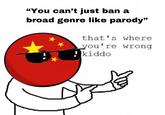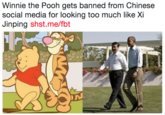Internet Censorship in China
Part of a series on China. [View Related Entries]
[View Related Sub-entries]
Overview
Internet Censorship in China refers to the strict provisions and restrictions placed on the Internet by the Chinese government in the People's Republic of China.
Background
In 1994, the Internet arrived in China and has since become a powerful tool for sharing information and communication.
Three years later, in 1997, the Ministry of Public Security attempted to secure control of the internet, instituting regulations on the web (excerpt of regulations below).[1]
"Individuals are prohibited from using the Internet to: harm national security; disclose state secrets; or injure the interests of the state or society. Users are prohibited from using the Internet to create, replicate, retrieve, or transmit information that incites resistance to the PRC Constitution, laws, or administrative regulations; promoting the overthrow of the government or socialist system; undermining national unification; distorting the truth, spreading rumors, or destroying social order; or providing sexually suggestive material or encouraging gambling, violence, or murder. Users are prohibited from engaging in activities that harm the security of computer information networks and from using networks or changing network resources without prior approval."
Developments
The Great Firewall of China
On June 1st, 1997, Wired[4] magazine published an article entitled "The Great Firewall of China," which is often credited as coining the colloquial name for the Golden Shield Project's efforts to censor the Internet. The article begins:
"At ISPs, Internet cafés, even state censorship committees, we meet the wired of China – and discover that the technology China needs to build the most powerful country on Earth in the 21st Century threatens to undermine the institutions that rule the nation. And Beijing's control freaks are worried."
In 1998, to stifle the growing opposition parties found in China, the Communist Party of China banned the China Democracy Party.
In addition, the government founded the Golden Shield Project that year. Its purpose is to provide nationwide network security but also manages the Bureau of Public Information and Network Security Supervision, which many believe to operate the Great Firewall of China (GFW), a censorship and surveillance project designed to block political dissent and opposition.[2]
The GFW's primary role is to block access to foreign or politically opposing websites in China as well as to slow down cross-border traffic. This has resulted in the the blocking and censorship of some of the world's most widely-used websites and wildely-read news sources.[3] These include:
Some of the GFW's techniques for censorship include: IP blocking, DNS filtering and redirection, URL filter, connection reset and more. As a result, many in China attempt to circumvent the program by using secure VPNs. However, in 2017, VPNs were outlawed in China.[5]
Examples of Censorship
Big Yellow Duck
Big Yellow Duck is a nickname given to a series of giant floating rubber duck sculptures designed by Dutch artist Florentijin Hofman. In June 2013, the phrase was banned by Chinese censors after an image of several giant rubber ducks photoshopped into the famous “Tank Man” photograph began circulating online in remembrance of the 1989 Tiananmen Square protests.[6]
On May 2nd, 2013, one of Hofman’s 54-foot high yellow inflatable ducks was launched in Hong Kong’s Victoria Harbor (shown below, left). On May 15th, the sculpture mysteriously deflated (shown below, right), which resulted in the hashtag “#bigyellowduck” rising to the top searched keyword on the Chinese microblogging and social networking site Weibo.[7]


Sina Weibo user Weiblog[8] subsequently posted a photoshopped version of the 1989 photograph “Tank Man”[9] (shown below, left) from the Tiananmen Square protests, in which the tanks were replaced with the large duck sculptures (shown below, right). Leading up to the anniversary of the protests on June 4th, several words were censored on Sina Weibo, including “1989,” “In today,” “anniversary” and “big yellow duck."


Winnie the Pooh
On July 17th, 2017, Chinese censors blocked memes featuring Winnie the Pooh after several viral images began circulating online that suggested a resemblance between the bear and Chinese president Xi Jinping (example below).

The Letter "N"
In February 2018 China's Communist Party announced that they would abolishing term limits on the presidency. This would allow President Xi Jinping to stay in power indefinitely.[10]
As a means to stifle discontent online, the Chinese government banned numerous terms from Weibo, a Chinese social media site. These terms included "incapable ruler," "I oppose," and the words "shameless," "disagree," "emperor" and more. Additionally, references to George Orwell's books Animal Farm and 1984.[11]
Among the most widely reported bits of censorship included the letter N. However, following the criticism of the censorship, the letter N was no longer blocked shortly after.
Many are unsure why the letter N was blocked, but some have speculated that the term N is a signifier for an "unknown quantity," which could be as a reference to XI Jinping's unknown amount of terms.

Liang Xiangyi Eye Roll
Liang Xiangyi Eye Roll refers to jokes, videos and online discussion regarding the frustrated facial movement of Chinese reporter Lian Ziangyi during a perceived fawning question for the Chinese government at the National People’s Congress. References and tributes to the moment were censored online by the Chinese government.
Online Parody Videos
On March 22nd, following the Lian Xiangyi Eye Roll, the State Administration of Press, Publication, Radio, Film and Television announced new regulations to ban videos that "distort, mock or defame classical literary and art works." This is part of the government's crackdown on videos that are deemed to be in "violation of socialist core values under President Xi Jinping."[12]
The regulations will force content makers to comply and make more "serious" content or be closed down. JustXiait, a team of Chinese parody bloggers, posted a statement, promising "to conduct self-inspection, cleanup and improvement" and "to make the program more in line with relevant laws and regulations, and to provide audience more interesting and wholesome programs."
HBO
On June 19th, 2018, HBO aired an episode of Last Week Tonight With John Oliver. The episode's main story centered around the controversial rise and leadership of Chinese president Xi Jinping (video below). During Oliver's breakdown, Xi's rise to power, allegations of human rights abuses, abolishment of term limits and his practice of censoring online dissent, particularly in regards to the Winnie the Pooh meme, were scrutinized.
Days later, on June 22nd, according to the internet censorship watchdog GreatFire,org,[13] HBO's online content has been blocked in mainland China. GreatFire reports that the HBO site hosting Oliver's content is "88% blocked in China." Additionally, the New York Times[14] reported that Chinese authorities have begun scrubbing Oliver's name from Weibo.
Twitch
In mid September 2018, access to Twitch was blocked on the Chinese web, and the Twitch application was removed from the iOS store. On September 20th, 2018, the tech news site Abacus News reported that the ban came several weeks after the Twitch mobile app became the #3 ranked free iOS application in China, presumably due to esports coverage at the Asian Games where Chinese competitors took home two gold medals. That day, The Verge reported that some "provinces spread throughout northern and southern China" still had access to the site.
Search Interest
External References
[1] Wikipedia – Internet censorship in China
[2] Wikipedia – Golden Shield Project
[3] Saporedicina – The list of blocked websites in China
[4] Wired – The Great Firewall of China
[5] Bloomberg – What China's VPN Ban Means for Internet Users: Quicktake Q&A
[6] Wikipedia – Tiananmen Square Protests of 1989
[7] Wall Street Journal – Chinese Bloggers Mourn Big Yellow Duck Demise
[10] The New York Times – China Moves to Let Xi Stay in Power by Abolishing Term Limit
[11] HuffPost – Chinese Censors Ban Winnie The Pooh, George Orwell And Letter ‘N’ To Silence Xi Critics
[12] Reuters – No laughing matter: China regulator bans TV parodies amid content crackdown
[13] Greatfire – is 88% blocked in China
[14] New York Times – After John Oliver’s Jokes About Xi Jinping, China Blocks HBO Website









![*touches ground* something bad happened here... Chinese then: 永远不会放弃你,永远不会让你失 望 Yŏngyuăn bù huì fàngqì ni, yŏngyuăn bù huì ràng ni shīwàng Chinese now: [deleted] • 4h [deleted] Reply 1 -4 + [deleted] • 3h [deleted] Vote [deleted] · 3h [deleted] + + -1 +](https://i.kym-cdn.com/photos/images/list/002/027/803/ae7.jpg)







Display Comments